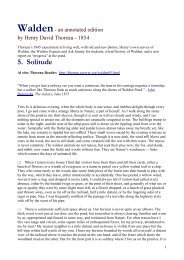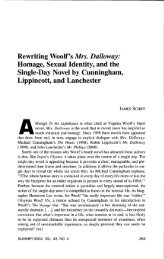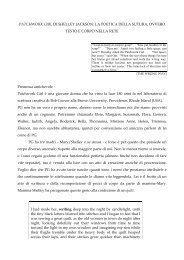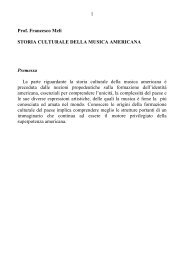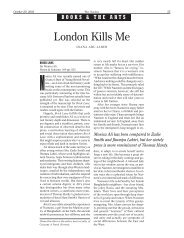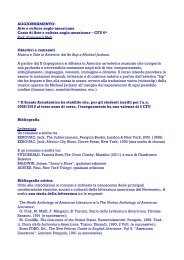Exciting Tales of Exotic Dark India - Paola Carbone
Exciting Tales of Exotic Dark India - Paola Carbone
Exciting Tales of Exotic Dark India - Paola Carbone
Create successful ePaper yourself
Turn your PDF publications into a flip-book with our unique Google optimized e-Paper software.
<strong>Exciting</strong> <strong>Tales</strong> <strong>of</strong> <strong>Exotic</strong> <strong>Dark</strong> <strong>India</strong> 289<br />
to its “reality”. By foregrounding the material and cultural differences<br />
between himself and westernized diasporic writers, Adiga seems to be<br />
privileging a notion <strong>of</strong> authenticity based on a stark divide between<br />
the national subject and the diasporic. The writer’s use <strong>of</strong> the present<br />
continuous verb tense in “I’m still standing” and “[I’m still] worrying”<br />
again stresses his rootedness in present-day Mumbai, while his reference<br />
to the queues, the over-crowded trains and the contaminated drinking<br />
water seems to sustain Chandra’s argument that “Real <strong>India</strong>”, seen as a<br />
site <strong>of</strong> everyday concrete struggle, is “approachable only through great<br />
and prolonged suffering”. 58<br />
Conclusion<br />
For Rushdie, authenticity is “the respectable child <strong>of</strong> old-fashioned<br />
exoticism” in the sense that “[i]t demands that sources, forms, style,<br />
language and symbol all derive from a supposedly homogeneous and<br />
unbroken tradition. Or else.” 59 The author cuts his last phrase short in<br />
all probability to draw attention to the fact that cultural expressions<br />
falling outside the “fantasy <strong>of</strong> purity” are regarded by the self-appointed<br />
gatekeepers <strong>of</strong> authenticity as non-existent and are therefore left<br />
unacknowledged. The accusations faced by Adiga <strong>of</strong> inauthenticity in the<br />
representation <strong>of</strong> a <strong>Dark</strong> <strong>India</strong> and <strong>of</strong> complicity with re-Orientalism,<br />
originating for the most part from <strong>India</strong>n critics, are far from original.<br />
The contentious critical issue over authenticity in IWE will no doubt<br />
continue to divide commentators, and will almost certainly continue to<br />
frame further discussions <strong>of</strong> The White Tiger. Following the pervasive<br />
rhetoric that Chandra deconstructs, authors such as Adiga (and to<br />
some extent Rushdie) are constrained by the need to “explain” <strong>India</strong><br />
to western readers and hence fall back on easily decoded rhetorical<br />
tropes <strong>of</strong> “real” <strong>India</strong>nness. In the end, Adiga’s “anxiety <strong>of</strong> <strong>India</strong>nness”,<br />
as expressed in the Man Booker Prize website interview, illustrates<br />
the multiple ways in which <strong>India</strong> is enmeshed in an unending process<br />
<strong>of</strong> cultural commodification. Indeed, the appeal <strong>of</strong> a <strong>Dark</strong> <strong>India</strong> in the<br />
literary marketplace – or, more accurately, the favouring by the Booker<br />
judges’ <strong>of</strong> representational strategies that purportedly <strong>of</strong>fer a revamped<br />
(exotic) <strong>India</strong> to the twenty-first century (western) reader – relies heavily<br />
on a previous contestation <strong>of</strong> discourses, facilitated by authors such as<br />
Rushdie, surrounding <strong>India</strong> and its allure as exotic other.<br />
NOTES<br />
The author wishes to thank David Callahan (University <strong>of</strong> Aveiro, Portugal)<br />
and Lisa Lau (University <strong>of</strong> Keele, UK) for helping her shape the arguments<br />
presented in this article.<br />
Downloaded from jcl.sagepub.com at Senate House Library, University <strong>of</strong> London on November 29, 2010



